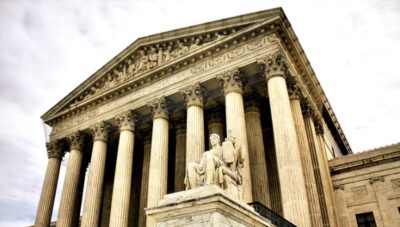Due Process and the Courts
What does the constitution say about due process?
The Fifth Amendment to the Constitution says clearly that no person shall be deprived of life, liberty, or property without the due process of law. Note that this says person, not citizen, and over the years the Supreme Court has consistently ruled that the Due Process Clause applies to all people in the United States.Do non-citizens have the right to due process in the U.S.?
Yes. The Constitution guarantees due process rights to all "persons," not just citizens. This means non-citizens, including undocumented immigrants, are entitled to fair treatment under the law. This includes the right to defend themselves in court. But recent Trump administration policies that speed up deportations and limit access to legal representation make it harder for non-citizens to get their fair day in court.- Access to legal representation Access to legal counsel is an essential part of our justice system and our democracy. In the criminal justice system, anyone facing even one day in jail gets a lawyer if they can't afford one. But immigrants facing deportation usually don't get that chance.The research is clear – the most effective way to ensure some level of due process for people navigating our complicated immigration system is for them to have trained attorney at their side. But Trump administration is now working to strip attorneys from as many people as possible, all in the name of increasing its deportation numbers. This attempt to eliminate basic due process will hurt people who already have few options.
- Fair day in court Due process guarantees that individuals have the opportunity to defend themselves in court. This includes non-citizens facing deportation.
Why is due process important?
We are seeing right now the importance of due process when it comes to President Trump's actions to carry out the so-called Alien Enemies Act, a 1798 wartime law that permits people to be deported outside of the normal framework of immigration law. President Trump has alleged that this law allows him to simply point at any person, declare them to be an alien enemy, and kick them out of the country without ever having a chance to see a judge. Thankfully, the Supreme Court said that is not true, and in a unanimous decision, ruled that people can challenge the Trump administration's invocation of the Alien Enemies Act. That is why due process is so important, because it means that no person can be rounded up and sent to another country without a chance to go to court and make the government prove their case.How is the American Immigration Council working to protect due process?
- We serve thousands of individuals in immigration detention centers through the Immigration Justice Campaign, our initiative with the American Immigration Lawyers Association. The Justice Campaign provides free legal services for immigrants who would otherwise have to navigate our complicated immigration system without a lawyer.
- We use the courts to demand a fair process for immigrants. Our litigation team is fighting back against the Trump administration’s blatant disregard for due process including filing a lawsuit challenging their illegal detention of immigrants in El Salvador’s notorious Terrorism Confinement Center (CECOT).

Supreme Court Flooded with Briefs Opposing Arizona SB 1070
Proponents of Arizona SB 1070 often insist that the infamous immigration law enjoys considerable public support. Yet even if such claims are correct, one would hardly know it from the flood of briefs filed at the Supreme Court this week opposing the measure. Unlike the monolithic set of briefs filed last month in support of SB 1070, the briefs opposing the law were submitted by a strikingly broad range of parties—from commissioners of the former INS, to more than 40 cities and counties, to a group of law enforcement officials that includes an Arizona sheriff whose county shares a border with Mexico. Read More

The Council Applauds Supreme Court Decision Rejecting Retroactive Application of Immigration Law Provision
Washington, D.C.—Yesterday morning, the Supreme Court issued an important decision, Vartelas v. Holder, No. 10-1211, rejecting the retroactive application of a provision of a law passed by Congress in 1996 that has prevented many lawful permanent residents (LPRs) from returning to the United States after a trip abroad. Citing… Read More

Supreme Court Brief on SB 1070: Arizona Seeking Confrontation, not Cooperation
When Arizona Governor Jan Brewer wagged her finger in President Obama’s face at a Phoenix airport earlier this year, she may have been seeking to score political points with the White House’s ideological opponents. What the governor may not have realized, however, is that she was giving the Obama administration the photographic equivalent of its closing argument in the legal challenge to SB 1070—namely, that Arizona is more interested in confronting the federal government than cooperating with it. Read More

Appeals Court Blocks Two More Provisions of Alabama’s Extreme Immigration Law
The U.S Court of Appeals for the 11th Circuit temporarily enjoined two more controversial provisions of Alabama’s extreme immigration law (HB 56), adding to the list of enjoined provisions. Yesterday, the 11th Circuit blocked Section 27, which bars Alabama courts from enforcing a contract with an unlawfully present person, and Section 30, which makes it a felony for an undocumented immigrant to enter into a “business contract” (including business licenses, mobile home registration and basic utilities, like water, gas, and electric services) with the state. The sections of Alabama’s law that remain in effect include the “papers please” provision, which requires law enforcement officers to determine the legal status of those when stopped or arrested whom they have reasonable suspicion to believe is in the U.S. without documents, as well as an E-Verify provision. Read More

Courts, State Legislators Pull Back on Restrictive Immigration Legislation
Although several states were eager to introduce their own restrictive immigration bills following Arizona and Alabama’s harsh laws, some legislators and federal judges are now pulling back on these costly bills. A federal judge in Utah this week refused to issue a ruling on the state’s immigration law in anticipation of a Supreme Court ruling on Arizona’s law while a federal judge in Nebraska struck down part of a restrictive city ordinance, finding a housing provision to be “discriminatory.” Meanwhile, legislators in Kansas and Virginia also failed to move forward on a series of restrictive immigration bills this week, due in part, as one article suggests, to the “political blowback to similar measures that have been enacted in states such as Arizona, Alabama and Georgia.” Read More

At Supreme Court, Arizona Gets Help from the Usual Suspects
Following the filing last week of Arizona’s brief defending SB 1070, the Supreme Court has received a barrage of briefs supporting the notorious immigration law from a none-too-surprising array of suspects. As might be expected, the arguments range from the predictable (that the Obama Administration fails to enforce the immigration laws) to the provocative (that states can carry out all immigration functions short of deportation) to the preposterous (that the Constitution allows Arizona to wage war against an “invasion” of immigrants). Of course, while neither Arizona nor their lawyers can be held responsible for the arguments of outside organizations, the briefs still offer a revealing look at the identities and motivations of SB 1070’s most ardent supporters. Read More

In Fight Over SB 1070, Arizona Makes an All-Too-Familiar Case to the Supreme Court
The Supreme Court case involving Arizona SB 1070 has officially entered the home stretch. On Friday, the Justices announced that oral arguments will take place on the fourth Wednesday in April, making it the final case to be heard this term. Yesterday, Arizona filed its much-anticipated brief at the Supreme Court, laying out its legal defense of the four provisions currently blocked by a preliminary injunction. To make its case to the Court, Arizona retained renowned attorney Paul Clement, a former Solicitor General who is simultaneously handling the legal challenge to the Affordable Care Act. But while the state may have brought in new lawyers, much of its brief reads like an all-too-familiar “study” from an anti-immigration organization. Read More

En Banc Court Reverses Adverse Holding, Says Immigrants Can Pursue Cases from Outside U.S.
Washington, D.C.- Today, an en banc panel of the U.S. Court of Appeals for the Tenth Circuit rejected the government’s attempt to bar noncitizens from seeking to reopen their cases from outside the United States. This is the seventh appellate court to find the “departure bar”—a regulation barring noncitizens from… Read More

Access to Counsel Before CBP
The American Immigration Council, with co-counsel Dorsey & Whitney LLP, filed a lawsuit against the Department of Homeland Security (DHS) and U.S. Customs and Border Protection (CBP) to compel the release of records relating to noncitizens’ access to counsel. Read More

It’s Time to Improve Noncitizens’ Access to Counsel
In the United States, most immigration decisions impacting noncitizens are made by immigration officials in informal proceedings far from a courtroom. While the right to an attorney (at the noncitizens’ own expense) in immigration court proceedings is widely recognized, the right to counsel in administrative settings outside of a courtroom is often overlooked or explicitly not recognized. As a result, many noncitizens are forced to navigate the immigration process alone. For those noncitizens that are represented, the Department of Homeland Security (DHS) often restricts their access to their lawyers. Read More
Make a contribution
Make a direct impact on the lives of immigrants.
